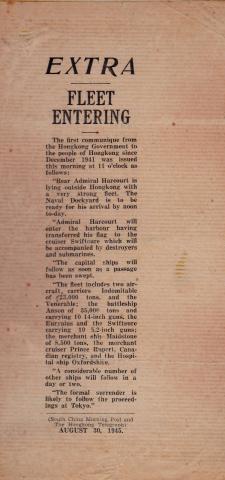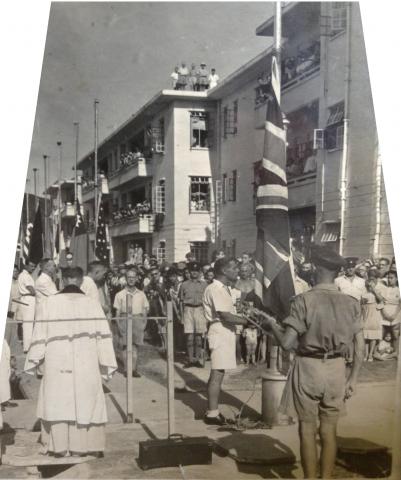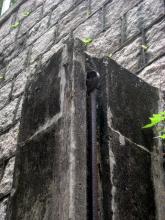70 years ago: Hong Kong's wartime diaries
30 Aug 1945, Chronology of Events Related to Stanley Civilian Internment Camp
Submitted by brian edgar on Mon, 2012-03-26 13:33Book / Document:Date(s) of events described:Thu, 30 Aug 1945The sky was clear and clean. There was no wind - just the faintest dawn breeze. The sun was storming up out of the China Sea in a roar of colour.
It's the day the Colony's been waiting for since December 25, 1941, and, as it unfolds, the weather is perfect:
(A) brilliant sun is scorching its way across a blue sky dotted with white clouds. A breeze from the east makes it cool in the shade...
Early in the morning the internees spot Rear-Admiral Cecil Harcourt's fleet about 20 miles from Hong Kong. Larry Andrewes, former Supreme Court Registrar, makes an attempt to reach it in a Chinese fishing boat. He's picked up by a picket-boat that's on its way to Stanley to ask about conditions in Hong Kong, and taken aboard H. M. S. Maidstone. He tells Captain Shadwell that Gimson's already established a British administration in town. He then takes a bath and is given fresh clothes. He sends a huge sandwich loaf into Stanley - the recipients are moved to tears by the sight.
At 11 a.m. the Hong Kong Government issues its first communique since December 25, 1941:
Rear-Admiral Harcourt is lying outside Hong Kong with a very strong fleet...
At about noon Harcourt lands to repossess Hong Kong and assure the safety of the population. He is ready for trouble, but in fact, there is little resistance.
Rear-Admiral Harcourt's first official duty is to visit Stanley. At 5 p.m. a truck full of marines draws up in Camp followed by three cars:
The cheering was something you hear only once in your life - if you are lucky enough to hear it once.
Prisoner Officer William Hudson begins to write to his wife Peg and son Peter who had been evacuated to Australia:
My Darlings,
I don’t know how to start this letter, I have so much to say – and I want to say it all at once. Well my Sweethearts – thank the Lord we have pulled through successfully. I never for one moment thought we would lose the War, but I had a horrid feeling they would do something to us.
He breaks off to attend the flag-raising ceremony and then resumes:
6.30 pm same day. I have just returned from the Flag hoisting ceremony. Admiral Harcourt came out here himself, although he landing at 12 the Japs asked 24 hours to decide, he gave them ½ hour to get out of the Dockyard, he then landed troops with tanks and after firing a few shots took command, I believe the Chinks waiting outside the Yard Gate with bamboos and knocking lumps off them. Anyway he got here by 5.15 pm, and believe me Peg it was heartbreaking. The bugle call - hoisting all Allied flags - lowering to half mast for the dead - the hoisting again - yes tears rolled down my cheeks - as it did to hundreds of others. Later in the evening a Naval {officer} Shadwell of HMS Maidstone i/c of submarines gave us a thrilling talk of the doings of his submarines saying the Navy had often watched us through their periscopes.
One internee has a rare experience:
FATHER GREETED BY OWN SON
When Mr. L. R. Brown was liberated from Stanley Camp, Hong Kong, first of his rescuers to greet him was his own son, Harold .
Harold Brown, a stoker on the depot supply ship Maidstone, had gone ashore with the first landing party
Mr Brown was former managing director of the China Constitution Company. His wife who lives in Bannerman Street, Cremorne received word of his release.
Not quite the one described though - the liberator was in fact his older brother.
George Wright-Nooth brings his diary to an end after forty-two months. The last words:
We are all celebrating!
Back in the UK they read about Gick's flight (see yesterday) and learn what's going on from Gimson's own lips:
As chief representative of the British Government now resident in Hongkong I have already established an office in the city of Victoria with the concurrence of the Japanese authorities.
Spouses, friends and relatives of those in Hong Kong can be fairly sure that the general situation is under control. But the agonising wait for letters or telegrams from their loved-ones still goes on.
Sources:
Sky clear/Cheering: Russell Clark, An End To Tears, 1946, 25;35
Brilliant sun: Les Fisher, I Will Remember, 1996, 238
Andrewes: John Luff, The Hidden Years, 1967, 227-228
Communique: John Luff, The Hidden Years, 1967, 228
Hudson letter:
http://blunderingblindlybackwards.blogspot.co.uk/2011/08/amanuensis-monday-letter-from-bill_15.html
Wright-Nooth: George Wright-Nooth, Prisoner of the Turnip Heads, 1994, 250
Gick, Gimson: Daily Express, August 30, 1945, page 1
Note:
Something of the family history of Mr. Brown is given at
https://griffithreview.com/edition-29-prosper-or-perish/where-is-home
The author, his grandson, tells us that his name was Lord (not a title) Roberts Brown. He'd left Hong Kong because of the Japanese threat but was caught there on business on December 8, 1941. He fought with the Volunteers, but was advised by a Catholic priest to discard his uniform during the final hours of fighting, hence ending up in Stanley. He was so emaciated when he arrived in Australia after liberation that his wife walked straight passed his outstetched arms.
30 Aug 1945, Barbara Anslow's diary
Submitted by Barbara Anslow on Sun, 2012-06-03 14:52Book / Document:Date(s) of events described:Thu, 30 Aug 194511am: Mabel's 22nd birthday, and Mary Taylor's 27th.
Tens of planes have been over all the morning, some of them zooming frighteningly. Fleet movements have been seen on the horizon.
19 heavy planes have just flown over us, and most people are up on the roof because they say the Fleet can be seen entering Lye Mun, but I can't see (well enough) so no good going.
7pm: Here I am sitting on the 4th floor of the French Mission, overlooking St John's Cathedral!At 2pm Miss (Grace) Ezra (Govt. stenographer) came and told me to be ready to go to Town at 5pm. So rushed round to see Father Hessler who gave me a blessing. Peggy (Barton) was running round me all the time, helping. Mum and Mabel did the packing. (Olive still not well).
Family helped carry my folded camp bed and meagre belongings down to the Ration Dump where transport was supposed to come, but when we arrived, the tranport had apparently left! While I waited, hoping another transport would arrive, family brought along my share of Mabel's birthday party planned for evning, and I ate it sitting on my suitcase at the road side.
Planes were zooming about, then a car drove through the gate, and out stepped the civil servant who was acting camp commandant now that Mr Gimson was in town, (I think he was our Commissioner of Prisons).'The Admiral will be here in a few minutes,' he called out, 'Tell every one to assemble outside the CSO!'
Everyone in hearing rushed off with the glad tidings, every one but me, I dared not move from the spot in case my transport arrived. People came running from all directions to get a vantage point outside Block 2, I felt so frustrated that I coudn't join them. ((There are photos of this))
Then in came two cars, the first contained Admiral Harcourt in full fig, and Mr Gimson (who is now Governor.) Then some Marines on small amphibians all looking so huge and healthy, their white starched uniforms gleaming, and their faces so pink that it looked as if they were wearing makeup.
Now I threw duty to the winds and dashed up the road to join the crowds. The Admiral made a short speech, short he said because he had get to other places in the Far East. The National Anthem was sung as the flags were raised.
The Admiral and his retinue drove off and I went back to my station near the gate and found several more government servants waiting for transport, which turned out to be an ancient bus with no glass in the windows, and holes in the wooden floor. As it drove us away from Stanley through puddles, water splashed up between the floor boards.
Among the passengers were 2 Eurasian teenage stepsons of Mrs. K. Rosselet, an ANS friend of Mum's, they had not been interned but had today been visiting their stepmother. Stubbs Road in an awful mess. The Gap Road flats ((where we Redwoods had lived until the Jap. attack)) had been bombed. Japanese were visible in Wellington Barracks (Queen's Road). British sailors were in Naval Dockyard barracks, throwing cigaretes down to Chinese children. We all waved frantically.
The bus stopped at the steps up to Battery Path opposite HSBank. The Rosselet boys carried my bed and luggage up the Path to the French Mission. (This building had now been commandeered for Government quarters and offices) ((It was outside this French Mission during the fighting that I had been waylaid by an Irish priest was asking all who passed by if they were RC, and offering Confesion and Holy Communion in the building. I had joined a short Confession queue on the ground floor. ))I was directed to the top floor, the two Rosselets kindly carried my luggage up to a room already occupied by Mrs. D. Mathias, Nan Grady and Barbara Budden, all Govt. employees.
We had dinner downstairs, served by Boys! Lovely, comfortable chairs with arms; flowers on table; soup, mashed potato, hamburger, fried eggplant. Sweet course I couldn't face, but had room for coffee with milk and sugar.
Listened to radio at 10.30pm, hearing Charles Moorad of U.S. broadcasting from Hong Kong - rather frightening perhaps to families in UK: "You can recognise an internee a block away" i.e., gaunt appearance, sunken eyes etc. ((We didn't think we looked like that !))There's a huge Japanese shrine on the Peak.
Tim Fortescue broadcast 'Good Night' on radio.
30 Aug 1945, Chronology of Events Related to Stanley Civilian Internment Camp
Submitted by David on Sat, 2013-08-24 18:20Book / Document:Date(s) of events described:Thu, 30 Aug 1945Thanks to Elizabeth Ride for contributing this text from the diary of Capt H. L. White, Winnipeg Grenadiers, who had been a POW in Shamshuipo camp:
"Aug.30, 1945. Had a great day today. Some of the people in Stanley sent invitations to Canadians to come over for a visit. I went along with Ted, visited some nurses. Had a very nice time. They were so glad to see us, gave us a nice lunch. We took some liquour. Had a swim.
While there the British fleet that has been lying off the Island for the past two days suddenly decided to move in. Vice-Admiral Harcourt and guard visited Stanley camp. Had a flag raising ceremony. The cheering was terrific, the children went crazy. ... ..."
The original is held in the Imperial War Museum, London.
30 Aug 1945, Eric MacNider's wartime diary
Submitted by alexis on Sun, 2014-07-27 23:22Book / Document:Date(s) of events described:Thu, 30 Aug 1945Allied Fleet entered under Rear Adm. C.H.J. Harcourt, C.B., CBE.
((This is the first entry in the diary in ink - and the last entry in the diary.))
This marks the end of Eric MacNider's wartime diary. Thanks to his nephew Keith for sharing this valuable document with us.
30 Aug 1945, Harry Ching's wartime diary
Submitted by Admin on Sat, 2015-05-16 15:57Book / Document:Date(s) of events described:Thu, 30 Aug 1945News suddenly received that British fleet is, at long last, about to enter the Harbour. Ignored Japanese still occupying office, Morning Post staff present produced leaflet in a limited edition which distributed in streets free of charge.
((Thanks to Brian Edgar for this copy of the leaflet:
The text reads:
EXTRA
FLEET
ENTERINGThe first communique from the Hongkong Government to the people of Hongkong since December 1941 was issued this morning at 11 o’clock as follows:
“Rear Admiral Harcourt is lying outside Hongkong with a very strong fleet. The Naval Dockyard is to be ready for his arrival by noon to-day.
“Admiral Harcourt will enter the harbour having transferred his flag to the cruiser Swiftsure which will be accompanied by destroyers and submarines.
“The capital ships will follow as soon as a passage has been swept.
“The fleet includes two aircraft carriers Indomitable of 23.000 tons, and the Venerable; the battleship Anson of 35,000 tons and carrying 10 14-inch guns, the Euryalus and the Swiftsure carrying 10 5.2 inch guns; the merchant ship Maidstone of 8,500 tons, the merchant cruiser Prince Rupert, Canadian registry, and the Hospital ship Oxfordshire.
“A considerable number of other ships will follow in a day or two.
“The formal surrender is likely to follow the proceedings at Tokyo.”
(South China Morning Post and The Hongkong Telegraph) AUGUST 30, 1945.
))
This marks the end of Harry Ching's wartime diary. Thanks to his son Henry for compiling and sharing this valuable document with us.
30 Aug 1945, R. E. Jones Wartime diary
Submitted by Admin on Tue, 2015-06-30 17:57Book / Document:Date(s) of events described:Thu, 30 Aug 1945Fine, E wind.
Many people in Block have tummy trouble.
Rigged enclosure for flag hoisting ceremony.
Staff meeting re booze?
Sunbath on roof.
Admrl Harcourt & Gimson etc arrived by 5pm & flag hoisting ceremony performed. Introduced to Ad. by Willcocks. Speech by Capt. of ‘Maidstone’.
Brandy with Steve.
Walk with G 9-10pm. Rocks W of Prison. ⨳ so sweet but I felt frustrated & a bit sunk.
Plenty of drink in room up to mid-night. Had very little.
((Jones makes a very brief mention of the flag hoisting ceremony, but he was the person who hoisted the flag! Here's a photo of the ceremony, courtesy of his daughter Rae. It shows him facing the flag, ready to hoist it up:
30 Aug 1945, Additional notes
Submitted by David on Tue, 2015-09-01 20:20Book / Document:Date(s) of events described:Thu, 30 Aug 1945Photos of Hong Kong from the last 3 years and 8 months are few and far between, but that is about to change with the arrival of the Allied Fleet.
The Canadian ship, HMCS Robert, was the fifth ship of the fleet to enter the harbour, and the first to berth in Kowloon, at Holt's Wharf. You can read about the Robert's experience that day, and see photos, at: http://gwulo.com/node/28372
Over on the aircraft carrier HMS Indomitable, Arthur Ball was gathering a very interesting set of photos: https://www.flickr.com/photos/peterball/albums/72057594063683584



